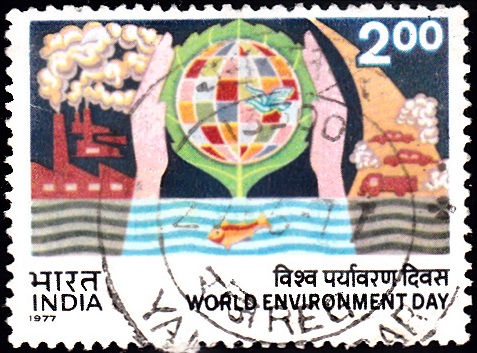
Environmental Quality
Complete set of 3 nos. of postage stamps on Environment : Water, Air and Noise Pollution :


 Issued by Israel
Issued by Israel
Issued on 9 Dec, 1975
The Designer : The stamps were designed by E. Weishoff, Ramat Ha-Sharon
Type : Stamps, Mint Condition
Colour : Multi colour
Denomination : 50 & 80 Agorot, 1.70 Pound
About :
- The processes of progress and development in human society over the past few generations have resulted not only in a considerable rise in living standards, but also in radical changes in the composition and quality of the environment in which we live. The main causes of these changes are:
- The rapid increase in world population.
- The speed of industrial development and the application of new technologies.
- Urban growth and sprawl.
- The intensification of agriculture.
- The combination of these has led, in many parts of the world, to the serious and ever-increasing pollution of our air, rivers and land and has created problems of waste disposal, noise, and radiation. As a result of this pollution, the health and welfare of Man, as well as his natural resources, have all been adversely affected and in those instances in which damage has been caused to nature, disagreeable living environments have resulted.
- Water pollution
- The factors principally responsible for water pollution are urban, agricultural and industrial waste.
- In any one year, the volume of urban waste amounts to some 300 million cubic meters. These wastes which are untreated, or at best, partially treated, flow from the towns for many kilometers along wadis (dried-up river beds), pollute the under-ground water supply and provide a source of unpleasant odours and breeding-grounds for mosquitoes. Only 20% of our urban waste undergoes a proper process of treatment at purification plants and is recycled for irrigation purposes.
- Industrial wastes create a serious problem of water pollution, particularly the wastes excreted by the food, textile, paper, leather, chemical and petro-chemical industries. The increasing use of chemical fertilizers, pesticides and weed-killers in agriculture also have dangerous side-effects on the environment.
- Air pollution
- The main sources of air pollution in Israel are caused by transportation, industry, power-generation and domestic heating.
- The chief pollutants in our urban atmosphere are carbon monoxide, nitrogen oxides, sulphur oxides, ozone, hydrocarbons and particulates. Air pollution creates health hazards to Man and Nature, causes economic damage and creates aesthetic nuisances.
- For Israel, the problem of air pollution is comparatively new, but it has recently reached such dimensions as to demand immediate preventive action. This has been brought about by a number of factors:
- In several areas of the country, the degree of air pollution has risen until it now approaches permitted limits.
- The pace of industrial development and pollution-causing activities is rapid, particularly in the coastal area where the greater part of the country’s population and industry are concentrated and where meteorological conditions are such as to interfere with the efficient dispersion of the pollutants into the atmosphere.
- Noise pollution
- The principal sources of noise are motor vehicles, industrial plants and places of entertainment.
- Noise pollution is the direct result of technological progress – the more progress, the greater the volume of noise pollution. The best definition of “noise” is probably “sounds heard by a listener against his will”. This definition emphasises the fact that noise is a subjective feeling. Noise inflicts damage on Man by affecting his hearing and causing various other physiological disturbances. The Israeli who enjoys a mixed climate, spends a great part of his time out of doors. The buildings are constructed of light materials and the windows of public buildings and private homes are left open most of the year. As a consequence, in residential and office areas, environmental noise becomes a nuisance to the population at large.
- Government action to deal with the problem of the quality of the environment
- After protracted discussions, the government finally formulated a policy of action based on three main principles:
- The responsibility for preventing damage to the environment falls on the various government departments as defined by existing laws and regulations. Each department must give due consideration to environmental factors when taking decisions.
- Where decisions affecting the environment are taken by more than one department, all decisions must be approved by an inter-ministerial committee.
- The majority of the problems of the quality of the environment can be avoided through proper preventive planning and every effort should be made to prevent the creation of problems rather than on solving them once they have arisen.
- After protracted discussions, the government finally formulated a policy of action based on three main principles:
- Conclusions
- Most of the efforts devoted to problems of the quality of the environment are concentrated today on developing technological and other means of dealing with the existing problems and on preparing suitable and efficient laws, regulations and procedures together with operating and supervisory staff. These are the first steps that are required to be taken when dealing with the problem. In the long-run, however, we must bear in mind that many of the current problems of the environment are the result of the actions of individuals and they can be successfully solved only as a result of a change in human behaviour.
- Most of the efforts devoted to problems of the quality of the environment are concentrated today on developing technological and other means of dealing with the existing problems and on preparing suitable and efficient laws, regulations and procedures together with operating and supervisory staff. These are the first steps that are required to be taken when dealing with the problem. In the long-run, however, we must bear in mind that many of the current problems of the environment are the result of the actions of individuals and they can be successfully solved only as a result of a change in human behaviour.
Subscribe
Login
0 Comments
Oldest







